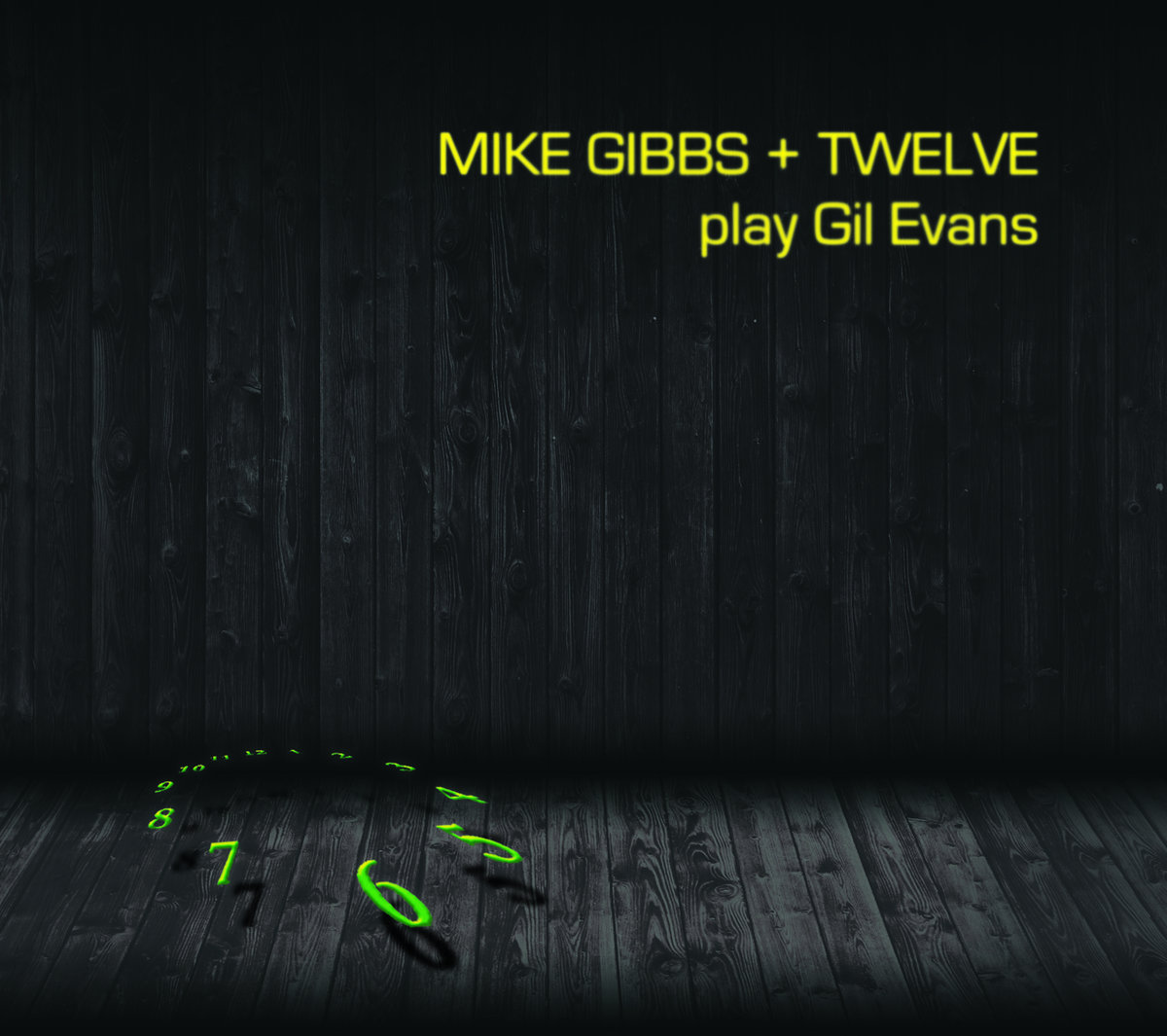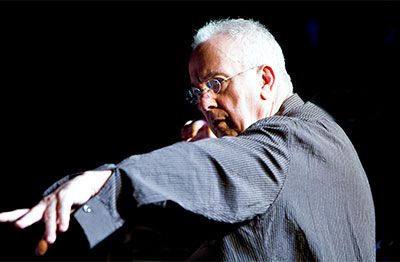12th February 2022: #WhirlwindinFocus – In Conversation with Mike Gibbs
 Almost a decade ago the incomparable composer, conductor, producer and arranger Mike Gibbs recorded Mike Gibbs + 12 play Gil Evans on Whirlwind Recordings. The 12-piece large ensemble recorded all the material on the album in just one day and features an eclectic mix of renowned improvisers living in the UK, with each track featuring at least one soloist. The record includes a mixture of some favorite Gil Evans arrangements and some of Mike’s own explorations.
Almost a decade ago the incomparable composer, conductor, producer and arranger Mike Gibbs recorded Mike Gibbs + 12 play Gil Evans on Whirlwind Recordings. The 12-piece large ensemble recorded all the material on the album in just one day and features an eclectic mix of renowned improvisers living in the UK, with each track featuring at least one soloist. The record includes a mixture of some favorite Gil Evans arrangements and some of Mike’s own explorations.
Having worked with Pat Metheny, John McLaughlin, Joni Mitchell, Whitney Houston, John Schofield and Peter Gabriel in a career that now spans over five decades. Mike Gibbs is a highly revered figure on the international music scene with an impressive discography and immeasurable influence.
Now, Mike Gibbs + 12 play Gil Evans has been reissued on 180gram, 2 x 12″ LP in Gatefold Artwork. Watch Mike’s incredible reaction to opening the vinyl for the first time below and read on as he reminisces about his extraordinary career and the profound influence Gil Evans had and continues to have on him…
In Conversation with Mike Gibbs by Rosie Hanley
“The first Gil Evans music I ever heard was his Gil Evans + Ten album – that was in the late 1950s – and it’s still reverberating.” – Mike Gibbs, 2013
“Gil Evans is my ultra hero,” says Mike emphatically, eight years later. “I met him early on at a party, but when I blinked he’d gone.” Mike bided his time and was patient to meet and get to know his idol: “I went to a rehearsal where I didn’t get to talk to him but just watched him”.
“I arrived in America in 1959 and Gil had already made Miles Ahead, which stunned me. I then got to hear Gil live and eventually in 1986, two years before his death, Gil and I were on a concert together for the inaugural Orchestre National de Jazz in Paris. It was more than a concert. I believe Simone de Beauvoir was there, it was a social event. Gil’s band was on it and my band was on it.”
Mike continues: “My wife was with me and Gil’s wife Anita was with him and at the end of the concert we expected champagne and parties, but everyone was gone. So, the four of us walked across the street to a restaurant to cool down… and now, finally, Gil and I were talking. I had learned already by now not to fawn over him. I didn’t say too much, I left him to make the conversation,” Mike reflects.
“We’re walking across the street and Gil’s smoking pot and we got into the restaurant and he just blows the smoke to the ceiling – I mean this is the stuff of dreams,” Mike’s evocative memory provokes powerful imagery of the evening.
“My wife and Anita were talking about getting their hair done and my wife mentioned that Joe Jackson’s hairdresser cut her hair – he lived in New York and we knew them. When Gil heard Joe Jackson’s name mentioned, he said “Oh Mike, you’ve got to check out this tune of his…” and this is exactly the sort of conversation I wanted. I had got it by not talking,” a poignant lesson and reminder to talk less and listen more.
Mike carries on with his story: “later, we were walking in the snow – it was winter – and a beggar came along and Gil immediately put his hand in his pocket. I mean, this was so real to me.” The respect Mike has for Gil Evans is palpable and I am in awe listening to the tale.
“Miles Davis had recorded Aura with Palle Mikkelborg but it wasn’t out yet. Gil had a tape, though. We were walking to the hotel and he gave me the tape. He was so generous, he wanted it to be heard, but he was anxious to get the tape back. I’ve even got a note somewhere with Gil’s phone number saying ‘as soon as you’re done, get it back to me’”.
Gil Evans died in 1988 but his influence continued to challenge and inspire Mike throughout his career.
Mike was drawn to the study jazz after failing his science course at university in South Africa. “I was at university studying sciences in the ‘50s and failed the second year because I was hanging around with local jazz musicians,” recalls Mike.
“My going to university was my Dad’s choice and to do chemistry was because I was naturally good at it at school. I’d get 98 percent in tests. I loved making stink bombs. I went to meet my dad to drive me home and he said: “look, I’ve got your results and you’ve failed, do you want to go back and repeat the year or would you like to do something else?” I said: I want to go to America and study jazz.”
Mike remembers, “my dad immediately said yes, so we spent two years saving money, enquiring about studying jazz and in January ‘59 off I went to America to study jazz.”
“Those four and half years I spent as a student were absolute heaven for me,” says Mike, “I already knew Gil’s music from ‘the ten’ and Miles Ahead and that year, Kind of Blue came out, Coltrane was being noticed. It was an exciting time. Just going to school in that era was exciting.”
“Gary Burton arrived in ’60 and we were mates. Gary’s talent was already immense and he got a record deal while we were students. He asked me to write a tune and arrange a tune. There I am as a student on my first record date with Phil Woods, Tommy Flanagan, Joe Morello, Clark Terry – you know, and I’m a student, can you imagine? This wasn’t just a record date it was an education, in capital letters.”
“From that moment I’ve been a writer and kept roof over my head. I’ve been doing it since that day.”
Over half a century later Mike is still an in-demand writer and continues to work hard on his craft. “I am slowing down” Mike reflects, “especially with getting old, my mental machinery gets exhausted quickly. But in music, if I’m depressed, I only have to listen to some favourite things which I go to that immediately bring me back to reality.”
I ask Mike to share these special musical moments and pieces with us: “In Grieg’s A minor, there’s two bars in the composition… I can’t tell you …[he sighs wistfully]…they so save me…I’ve looked at them in the score but that doesn’t interest me. It’s the effect they have on me. It’s actually always at the end of a phrase, in the second movement. The orchestra plays at the beginning and as they’re playing it the last note is the entry of the piano – that entry note is perfection – and I don’t often use that word.”
Mike is invigorated as he shares another of his musical pick-me-ups: “there’s a version of Wagner’s Tristan und Isolde by Van Karajan and Jessye Norman [he sighs again] …it is so extraordinary.”
“I have listened to other versions of this. I’ve just found a recording of Daniel Barenboim doing it and it’s so clear. By listening to that one, I can hear the notes more, but the Jessye Norman one has a depth of emotion that is beyond description. The lovely thing is at the end, the audience are beside themselves. They leap to their feet with ecstasy and that joy fills me. Whatever state I’m in, it brings me to reality.”
“There’s another piece does the same thing, by Aretha Franklin that she performed live in 2015 at a big event. The audience does the same thing – they are bursting.”
“Aretha sits down and she’s playing – there’s nothing to say about the perfection about the music. She’s just so communicating and then gets up and she takes her arms out of the mink coat and sings to the audience. She looks divine because it comes from inside.”
“These pieces are a couple of about five or six that if I have knots, I listen to and time disappears. That’s the beauty of art,” Mike continues, “let alone music, there is no time. For three minutes there is no time. Anything Gil does of course, does the same thing for me.”
“So he’s still inspiring you now?” I ask. “He’ll never stop,” Mike answers matter-of-factly.
Mike Gibbs + 12 play Gil Evans is available on 180gram, 2 x 12” LP in Gatefold artwork here.




